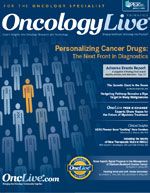Publication
Article
Oncology Live®
Fast-Moving Targets
Author(s):
There are many reasons, why we must now move beyond the "one drug-one test" model that has resulted in these diagnostics.
OncLive Chairman,
Mike Hennessy
It’s hardly news to anyone who practices oncology that research into the molecular drivers of cancer is uncovering potential fresh targets at a torrid pace. What’s more complicated, of course, is how to validate these discoveries and put them into practice. During the past decade, FDA policies intended to encourage the development of a companion diagnostic for each new molecularly targeted therapy have served patients well in many respects. We have multiple HER2 assays that help determine whether patients are candidates for therapies that target that mutation, a diagnostic is frequently approved along with a new drug, and a biomarker test is even available now for the immunotherapy agent pembrolizumab in non—small cell lung cancer.
There are many reasons, however, why we must now move beyond the “one drug—one test” model that has resulted in these diagnostics. In this issue of OncologyLive, we offer the insights of experts who are tackling the challenges involved in translating these laboratory and technological advances into clinical practice.
Our cover story, “Personalizing Cancer Drugs: The Next Front in Diagnostics,” captures the broad issues including the scientific questions that remain unanswered about nextgeneration sequencing and the regulatory barriers in getting those technologies approved. An undercurrent in the discussion is the difficulty in getting payers to reimburse emerging diagnostics, a factor with which many practicing oncologists may be all too familiar.
While the future might still be on the horizon when it comes to the next stage in diagnostic assays, it seems to have already arrived when it comes to testing for hereditary breast and ovarian cancers.
In our Precision Medicine in Oncology section, we report on a recent study that suggests a clinical value to multigene panels versus single-gene BRCA testing for patients who are candidates for genetic evaluation. These issues are on our radar because they’ve been popping out of the peer-reviewed literature and conference programs. One of our editorial goals is to highlight developments in emerging technologies for physicians too busy treating patients to parse the many research reports themselves.
Please let us know what you would like to learn about these developments and, as always, thank you for reading.
































%20(2)%201-Recovered-Recovered-Recovered-Recovered-Recovered-Recovered-Recovered-Recovered-Recovered-Recovered-Recovered-Recovered-Recovered-Recovered-Recovered-Recovered-Recovered.jpg?fit=crop&auto=format)
%20(2)%201-Recovered-Recovered-Recovered-Recovered-Recovered-Recovered-Recovered-Recovered-Recovered-Recovered-Recovered-Recovered-Recovered-Recovered-Recovered-Recovered-Recovered.jpg?fit=crop&auto=format)
